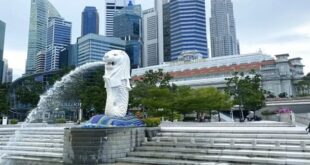This evening, the tally of flood victims in Kelantan and Terengganu has surged to 986, more than three times the figure reported earlier today. Kelantan bears the brunt with 514 victims from 151 households taking refuge in 13 relief centers across Tanah Merah, Kuala Krai, and Machang. Meanwhile, in Terengganu, 472 victims from 127 families have been relocated to 14 shelters in Hulu Terengganu and Besut. The floods are attributed to unrelenting heavy rainfall along the east coast of the peninsula. This marks the third occurrence in over a month that portions of Kelantan and Terengganu have experienced flooding. Both states were severely affected by monsoonal floods from late November to early December, which were reported to be the worst in a decade, leading to the evacuation of more than 150,000 individuals from their residences. The meteorological agency has also anticipated ongoing heavy rainfall in several areas of the two east coast states tomorrow, as reported by Bernama. The impacted regions in Kelantan include Jeli, Tanah Merah, Machang, and Kuala Krai, while the weather warning also pertains to Besut, Setiu, Kuala Nerus, Hulu Terengganu, Dungun, and Kemaman in Terengganu. The agency further cautioned of “severe level” continuous rain in Tumpat, Pasir Mas, Kota Bharu, Bachok, Pasir Puteh, and Gua Musang in Kelantan; and Kuala Terengganu and Marang in Terengganu.
Read More »world news
Man nabbed after using dustbin lid in restaurant fight
A 36-year-old individual has been apprehended following an incident where a man was punched and hit on the head with a garbage can lid at a dining establishment in Machang Bubok, Bukit Mertajam, Penang last Friday. A widely circulated video of the occurrence at 2:45 AM last Friday became viral, prompting law enforcement to initiate an investigation that led to the suspect’s apprehension, as reported by Bernama. “The motive behind the incident stems from a personal disagreement. The suspect assaulted the victim in the face and struck him with a garbage can lid,” stated Seberang Perai Tengah police chief Helmi Aris. The suspect is currently in custody until tomorrow. Helmi mentioned that investigations are underway for the voluntary infliction of injury using a dangerous weapon and for criminal threats. A widely shared video clip of the event depicted a man attacking the victim, who is reportedly a worker at the Machang Bubok restaurant.
Read More »Row over change of ‘clothes’ for Kuching’s iconic cat statue
A transformation of the ‘outfit’ for the legendary feline statue in Kuching, Sarawak, ignited a slight uproar after it swapped its Christmas garb for traditional Chinese attire. Nonetheless, Kuching South mayor Wee Hong Seng brushed off the social media backlash regarding the statue’s ‘costume’ being altered so swiftly following the recent holiday. The modification was made in preparation for a music video for the Kuching South City Council’s Chinese New Year anthem set to debut on January 2. Wee stated that it would have been inappropriate for the statue to retain its Christmas costume in the video, as reported by The Borneo Post. “We assure the public that we are aware of these seasonal shifts. Adorning the cat according to festive occasions is part of our comprehensive efforts to draw more visitors and enhance the city’s charm. “We appreciate all feedback, particularly constructive criticism, as it aids us in enhancement,” he remarked. Some online users commented that it was disrespectful for MBKS to alter the cat statue’s outfit so soon after Christmas, suggesting the city council should have postponed the change until at least January 1. Conversely, others contended that this adjustment was necessary given that Chinese New Year is on January 29.
Read More »‘Finally, we made it!’: Ho Chi Minh City celebrates first metro
Today, thousands of selfie-enthusiast residents of Ho Chi Minh City packed into train carriages as the bustling center, notorious for its traffic jams, celebrated the launch of its inaugural metro line after years of waiting. Massive queues overflowed from every station along the $1.7 billion line, stretching nearly 20 kilometers from the heart of the city. Women donned in traditional “ao dai,” soldiers in full uniform, and families with small children eagerly queued to board. “I know the project is behind schedule, but I can’t help but feel incredibly honored and proud to be among the first passengers on this metro,” commented office employee Nguyen Nhu Huyen, capturing a selfie in her overcrowded carriage. “Our city has finally reached a level akin to other major cities worldwide,” she expressed. It has taken Vietnam’s commercial hub 17 years to achieve this milestone. Primarily funded by Japanese government loans, the project was initially approved in 2007 with a projected cost of merely $668 million. When construction commenced in 2012, officials promised the line would be operational within five years. However, as delays accumulated, the number of cars and motorbikes surged in the city of 9 million, leading to severe congestion, increased pollution, and prolonged travel times. The metro “addresses the escalating commuting demands of residents and aids in alleviating traffic jams and environmental degradation,” stated the city’s deputy mayor, Bui Xuan Cuong. Cuong acknowledged that authorities faced “numerous challenges” to bring the project to fruition. ‘Annoying’ setbacks State media cited slow fund distribution, unforeseen technical issues, staffing challenges, and the Covid-19 pandemic as reasons for the delays. “The setbacks and budget overruns have been disheartening,” stated Professor Vu Minh Hoang at Fulbright University Vietnam, who cautioned that with only 14 station stops, the line’s impact on reducing congestion would be limited in the near term. Nonetheless, he remarked, it represents a “significant milestone for the city’s urban planning.” With valuable lessons learned, he noted that “the development of future lines will be progressively easier, quicker, and more economically feasible.” Meanwhile, aboard the train, 84-year-old war hero Vu Thanh shared with AFP that he was thrilled to experience underground travel in a more cheerful context after spending three years battling American forces in the famed Cu Chi tunnels, an extensive subterranean network. “This feels so different from the underground experiences during the war. It’s wonderfully bright and pleasant here,” he remarked. Reflecting on the past delays, he added: “We constructed tunnels to evade our enemies long ago, so creating a tunnel for a train shouldn’t be that difficult.” “At last, we’ve made it!”
Read More »Indonesian tsunami survivor holds on to hope for missing son after 20 years
Before Saudah’s home on Sumatra island in Indonesia lie two battered coast guard vessels, stranded by a tsunami two decades ago, serving as a constant reminder that her youngest son remains absent. Saudah, who like many Indonesians is known by a single name, holds on to the belief that Muhammad Siddiq, just six years old when the catastrophic Indian Ocean tsunami hit on December 26, 2004, is still alive and clings to the hope of a reunion one day. This catastrophic wave, initiated by a 9.1 magnitude earthquake, claimed the lives of approximately 230,000 individuals across the coastal regions of over a dozen nations, including India, Indonesia, Sri Lanka, and Thailand, marking it as one of the most lethal disasters in recorded history. Aceh, the province at the northern tip of Sumatra where Saudah and her family live, accounted for more than half of the casualties. Now at 64, Saudah vividly recalls the earth shaking and her neighbors fleeing in terror. She remembers desperately holding on to Siddiq as she urged her seven other children to flee to the mosque. “I didn’t flee. I lay down clutching Siddiq tightly, thinking it was merely a strong wind. I prayed to God, asking: ‘What is happening?’” Saudah recalled, her voice quaking. “Then I returned to my house just as I noticed the wave approaching, slithering towards us,” she described. While holding Siddiq, she bolted. She only released him once they reached the mosque, but by that time, the massive wave had caught up with them. They were engulfed by the water and separated. In the chaos that followed, Saudah was reunited with only six of her children – Siddiq and one of her daughters remain missing. That daughter is believed to have been laid to rest in a mass grave. Some survivors reported seeing Siddiq among the 500,000 displaced by the disaster, and Saudah’s husband insists Siddiq has visited him in dreams, assuring him that he is alive. The family clings to that hope, praying that Siddiq will make his way to their new home, which now occupies the ground where their previous house once stood. “We continue to look for him, and I regularly share his picture on social media,” shared Saudah’s 42-year-old son, Femi Malisa
Read More »Thailand to raise daily minimum wage by 2.9% from Jan 1
The minimum salary, which varies by region, will increase by seven to 55 baht from the previous daily rate of 330 baht to 370 baht, he mentioned. This proposal will be presented to the cabinet on Tuesday, he noted. The increase had been delayed from October due to a lack of quorum in the committee meetings, which consist of representatives from employers, employees, and the government. This adjustment is part of the ruling Pheu Thai party’s election promise, which has committed to raising the daily minimum wage to 600 baht by the year 2027. It is also a critical component of the government’s initiative to stimulate growth in Southeast Asia’s second largest economy, which is currently facing challenges from escalating household debt and a sluggish manufacturing sector.
Read More »Bloomberg issued correction directions over article on S’pore property deals
Following a recent report on transactions involving good class bungalows (GCB) in Singapore, Bloomberg has received correction directives under the nation’s fake news legislation. The Edge Singapore, The Independent Singapore, and The Online Citizen have likewise been directed to make corrections for partially or fully reflecting the statements reported in the Bloomberg piece. Edwin Tong, Singapore’s deputy law minister, mandated these orders under the Protection from Online Falsehoods and Manipulation Act (Pofma), as stated by the law ministry of Singapore. In an article published on December 12 entitled “Singapore mansion transactions are becoming increasingly cloaked in confidentiality,” Bloomberg detailed how the ultra-wealthy were quietly acquiring estates in the city-state. The report also referenced property dealings supposedly involving Singapore’s law and home affairs minister K Shanmugam, alongside manpower minister Tan See Leng, who announced on December 16 their intent to pursue legal action against the article, labeling it “libellous.” The law ministry asserted that the “false statements” in the piece “undermine the transparency of property transactions in Singapore.” “They collectively foster the misconception that Singapore lacks a robust legal framework for requiring disclosure of information in GCB transactions,” the ministry articulated. “It is vital for public interest that these inaccuracies are rectified to prevent the erosion of trust in the government.” The ministry emphasized that the article inaccurately claimed that government records for GCB sale transactions are unavailable to the public if caveats are not filed. The ministry also highlighted that information on property ownership and transfers, including all GCBs, is accessible on the Integrated Land Information Service portal, overseen by the Singapore Land Authority (SLA), irrespective of caveat lodging for the sale. Caveats are filed voluntarily by parties seeking to safeguard their interests in a property rather than for transaction tracking or transparency. Additionally, the ministry stated that the article wrongly asserted that the ultimate beneficial owner of a GCB sale transaction is not required to be disclosed to the government. The government mandates stringent disclosure of identities and citizenship of purchasers and ultimate beneficial owners in every landed residential property transaction, encompassing GCB transactions. As part of the correction directive, Bloomberg is obliged to include a notice linking to the government’s clarification regarding the article on its website and its social media posts on Facebook and X. The Edge Singapore, The Independent Singapore, and The Online Citizen, which fully republished the Bloomberg article, must likewise display these notices on their websites and Facebook pages
Read More »Indonesia’s counter-terrorism agency mulls parole for former militant leaders
Indonesia is contemplating conditional release for two ex-leaders of the Jemaah Islamiyah (JI) extremist organization and clemency for its imprisoned affiliates, according to senior officials, after 1,300 former members expressed their allegiance to the nation. The al Qaeda-associated JI was implicated in orchestrating some of the most horrific assaults in Indonesia’s recent past, including the bombing of Bali nightclubs in 2002 that resulted in over 200 fatalities, primarily foreigners, as well as an attack on a Jakarta hotel in 2003 that left 12 dead. This initiative follows the declaration made by senior affiliates in June regarding the disbandment of the network. Eddy Hartono, leader of Indonesia’s counter-terrorism agency, informed Reuters that there are currently 115 former JI members incarcerated, and the agency may recommend to the government conditional release for ex-leaders Abu Rusdan and Para Wijayanto. Abu Rusdan was at the helm of JI during the Bali bombings and was imprisoned in 2003 for three years for harboring a militant responsible for the attack, who was later executed. He was incarcerated again in 2022 for six years due to his continued involvement with a prohibited network. Para Wijayanto, who led JI from 2009 to 2019, was sentenced to seven years in prison in 2020. “We will consult with the ministry. If they fulfill the legal criteria, we will recommend (the conditional release),” Eddy stated. Diminishing Influence Adhe Bhakti, a security analyst at the Centre for Radicalism and Deradicalisation Studies, remarked that the suggested parole for the two former leaders would signify their collaboration in revealing the remaining networks and persuading former members to affirm their loyalty to Indonesia. At its zenith, JI was one of Asia’s most dreaded extremist organizations, with factions in Malaysia, Singapore, and the Philippines, but its sway and backing diminished following a rigorous crackdown by authorities and deradicalisation efforts. The ministry of law and penitentiary affairs is gathering information on the number of former JI members to be granted parole or amnesty, stated senior minister Yusril Ihza Mahendra on Monday. President Prabowo Subianto aims to award amnesty to young offenders during a time when they are capable of becoming productive members of society, the minister added, emphasizing that procedures are in place to implement the amnesty and terminate pending charges. “God willing, it will be executed in the initial months of 2025,” he said in a statement. Two operatives sentenced to life for their roles in the Bali attack, planner Hutomo Pamungkas, also known as Mubarok, and bomb-maker Ali Imron, remain incarcerated. Prabowo also intends to grant clemency to 44,000 inmates – ranging from drug offenders to activists imprisoned for defamation – and has indicated he may also permit individuals involved in corruption to evade punishment if they return the stolen assets.
Read More »Taiex tops Asian markets with KLCI at No 6, Kospi at rock bottom
Taiwan’s Taiex has risen to become Asia’s top-performing stock market index in 2024, with Hong Kong’s Hang Seng Index following closely in second place, while the FTSE Bursa Malaysia KLCI (FBM KLCI) has secured a solid sixth position. As of December 23, the Taiex recorded a remarkable increase of 28.85% for the year, with the Hang Seng at 16.63%, and FBM KLCI at 9.73%. Singapore’s Straits Times Index claimed the third spot at 15.78%, trailed by Japan’s Nikkei 225 at 15.65% and China’s CSI 300 Index at 14.64%, according to a ranking compiled by CNBC yesterday. Completing the roster of Asia’s top bourses are India’s Nifty 50 at 9.28% and BSE Sensex at 8.69%, along with Australia’s ASX 200 at 8.05%. Conversely, South Korea’s Kospi Composite Index, which plunged 8.03%, endured the embarrassment of being Asia’s least successful market. The Jakarta Composite Index also lagged, experiencing a loss of 2.42%, while Thailand’s SET dropped by 2.04%. The robust enthusiasm from investors for technology and tech-related stocks propelled the Taiex, with major tech players such as Taiwan Semiconductor Manufacturing Company (TSMC) soaring 82%, and Foxconn, listed as Hon Hai Precision Industry, witnessing a rise of 78%. Although the tech and artificial intelligence (AI) surge bolstered Taiwan’s stocks, it resulted in minimal progress in South Korea, which stands as the only major Asian market finishing the year in negative figures. This year has been grim for South Korean equities, with the so-called ‘Korea discount’ widening in comparison to global counterparts. The nation’s recent political turmoil is anticipated to embed this trend further. The ‘Korea discount’ signifies South Korean stocks trading at depreciated valuations against regional competitors, driven by investor apprehensions regarding circumstances like corporate governance at family-run conglomerates, or ‘chaebols’, which wield significant influence over the national economy. The prominent chaebols comprise industry titans such as Samsung Electronics, LG, SK, and Hyundai. The ongoing political unrest has exacerbated investment sentiment, particularly following President Yoon Suk Yeol’s impeachment that occurred post his martial law declaration on December 3. Uncertainty looms for 2025. While the outlook has largely been optimistic for Asia’s leading stock exchanges, including Bursa Malaysia, in 2024, analysts convey a sense of trepidation for the upcoming year. Japanese financial services firm Nomura anticipates that Asia will confront tighter global financial conditions in 2025, stemming from elevated interest rates and a robust dollar. Their analysts ominously noted that ‘turbulence looms ahead for the region’. They suggest that, although strong AI demand and export front-loading may offer some growth support in the initial quarter, the region ‘seems poised for choppier waters’ from the second quarter onwards, due to the repercussions of the Donald Trump presidency, China’s overproduction, and a decelerating semiconductor cycle. Nevertheless, Nomura forecasts better growth prospects for Asian nations with stronger domestic demand support systems, such as Malaysia and the Philippines, while India, Thailand, and South Korea may encounter challenges. The status of China’s economy is regarded as a crucial focus for investors, as its health or decline will reverberate through its Asian trading partners and their stock markets. Nomura’s analysts foresee additional stimulus from China to bolster its economy, while emphasizing the necessity for Beijing to stabilize its ailing property market, rectify its fiscal policy, and mitigate geopolitical tensions to foster a genuine and sustainable recovery. The FBM KLCI, which concluded 2023 with 1,454.66 points, closed at 1,596.20 yesterday. This index, co-managed by FTSE and Bursa Malaysia, comprises the 30 largest companies on the exchange by market capitalization.
Read More »Sweeping Vietnamese internet law comes into force
New regulations for the Vietnamese internet mandating that Facebook and TikTok authenticate user identities and surrender data to authorities took effect on Wednesday, which critics argue represents yet another assault on free speech. Under ‘Decree 147′, all technology corporations operating in Vietnam are required to validate user accounts using their phone numbers or Vietnamese ID numbers and keep that information along with their full name and date of birth. They are obligated to present that information to officials upon request and eliminate any content deemed ‘illegal’ by the government within a 24-hour timeframe. The new regulations took effect on Wednesday, as reported by state media VNExpress. All social media platforms were allotted 90 days to report on ‘the total number of regular visits from Vietnam’ and the monthly count of regular users to authorities, the site stated. ‘By utilizing Decree 147, they will publicly silence dissenting voices,’ remarked activist Dang Thi Hue, who shares insights on political and social matters on her Facebook page with 28,000 followers. The decree was described as ‘the latest indication of violation of fundamental freedoms… with an unclear distinction between what is permissible and what is not,’ stated former political prisoner Le Anh Hung. ‘No one desires imprisonment, so naturally, some activists will exercise greater caution and be apprehensive due to this decree.’ The stringent Vietnamese regime typically acts swiftly to quash opposition and detain critics, particularly those who gain traction on social media. In October, blogger Duong Van Thai – boasting nearly 120,000 YouTube followers, where he frequently streamed content critical of the government – was sentenced to 12 years in prison on allegations of disseminating anti-state information. Decree 147 expands upon a cybersecurity law from 2018 that faced fierce criticism from the US, EU, and advocates for internet freedom, who claimed it mirrored China’s stringent censorship practices. Additionally, the decree stipulates that only authenticated accounts may livestream, affecting the rapidly growing number of individuals making a living through social commerce on platforms such as TikTok. In addition to the implications for social media companies, the new regulations also impose limitations on gaming for minors, aimed at combating addiction. Game developers are expected to enforce a session limit of one hour per gaming session and a maximum of 180 minutes a day across all games. According to data research firm Newzoo, just over half of Vietnam’s 100 million populace regularly engages in such gaming activities. A significant portion of the population is also active on social media, with the Ministry of Information and Communications estimating approximately 65 million Facebook users, 60 million on YouTube, and 20 million on TikTok.
Read More »







